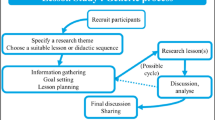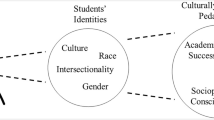Abstract
The paper reports on the use of culturally relevant teaching in a class located in a patriarchal community. The paper is conceptualised around the notion that learners’ familiar context provided by the socio-cultural activities can facilitate mathematics learning and make it fun to learn. Data were derived from a lesson activity using semi-structured interviews, observation and video recordings. The findings reveal the prevalence of culturally oriented gender-related stereotypes such as tendency by boys to marginalise girls during the lesson activities and girls, in turn, attribute the treatment to their cultural beliefs and practices.

Similar content being viewed by others
References
Amoah, V. K. (1996). The place of ethnomathematics in the secondary school curriculum in South Africa. In: D. Grayson (ed.) Proceedings of the fourth annual meeting of the Southern African Association for Research in Mathematics and Science Education, (pp. 46–54). University of the North, South Africa.
Borden, L. L. (2013). What’s the word for? Is there a word for? How understanding Mi’kmaw language can help support Mi’kmaw learners in mathematics. Mathematics Education Research Journal, 25(1), 5–22.
Borko, H., Jacobs, J., Eiteljorg, E., & Pittman, M. E. (2008). Video as a tool for fostering productive discussions in mathematics professional development. Teaching and Teacher Education, 24, 417–436.
Brodie, K. (2000). Teacher intervention in small-group work. For the Learning of Mathematics, 20(1), 9–16.
Darsie, R. (2003). String Games. New York: Sterling Publishing Co, Inc.
Davison, D. M., & Miller, K. W. (1998). An ethnoscience approach to curriculum issues for American Indian students. School Science and Mathematics, 98(5), 260–265.
Department of Education. (2008). National Curriculum Statement Grades 10–12 Mathematics. Pretoria: Government Printers.
Enyedy, N., Danish, J. A., & Fields, D. A. (2011). Negotiating the ‘relevant’ in culturally relevant mathematics. Canadian Journal of Science, Mathematics, and Technology Education, 11(3), 273–291.
Francisco, J. M. (2013). Learning in collaborative settings: Students building on each other’s ideas to promote their mathematical understanding. Educational Studies in Mathematics, 82(3), 417–438.
Gay, G. (2002). Preparing for culturally responsive teaching. Journal of Teacher Education, 53(2), 106–116.
Guerra, P., & Lim, W. (2014). Latinas and problem solving: What they say and what they do. Journal of Urban Mathematics Education, 7(2), 55–75.
Hastie, P. A., Martin, E., & Buchanan, A. M. (2006). Stepping out of the norm: An examination of praxis for a culturally-relevant pedagogy for African-American children. Journal of Curriculum Studies, 38(3), 293–306.
Horsthemke, K., & Schafer, M. (2007). Does ‘African mathematics’ facilitate access to mathematics? Towards an ongoing critical analysis of ethnomathematics in a South African context. Pythagoras, 65, 2–9.
Jung, K., & Chung, H. (2005). Gender equality in classroom instruction: Introducing gender training for teachers in the Republic of Korea. Bangkok: UNESCO Bangkok.
Kea, C., Campbell-Whatley, G. D., & Richards, V. H. (2006). Becoming culturally responsive educators: Rethinking teacher education pedagogy. National Centre for Culturally Responsive Educational Systems. Tempe: University of Arizona.
Khuzwayo, H. B., & Bansilal, S. (2012). Granting learners an authentic voice in the mathematics classroom for the benefit of both the teacher and the learner. Pythagoras, 33(2), 7. doi:10.4102/pythagoras.v33i2.163. Art. #163.
Kisker, E. E., Lipka, J., Adams, B. L., Rickard, A., Andrew-Ihrke, D., Yanez, E. E., et al. (2012). The potential of a culturally based supplemental mathematics curriculum to improve the mathematics performance of Alaska native and other students. Journal for Research in Mathematics Education, 43(1), 75–113.
Ladson-Billings, G. (1992). Liberatory consequences of literacy: A case of culturally relevant instruction for African American students. The Journal of Negro Education, 61(3), 378–391.
Ladson-Billings, G. (1995). Toward a theory of culturally relevant pedagogy. American Educational Research Journal, 32(3), 465–491.
Lampert, M. (2001). Teaching with problems and the problems of teaching. New Haven, CT: Yale University Press.
Laridon, P. E. L., Mosimege, M., & Mogari, D. (2005). Ethnomathematics in developmental curriculum research in South Africa. In C. Keitel, R. Vithal, & J. Adler (Eds.), Handbook of Research in Mathematics Education in South Africa (pp. 133–159). Pretoria: HSRC Press.
Lipka, J., Wong, M., & Andrew-Ihrke, D. (2013). Alaska native indigenous knowledge: Opportunities for learning mathematics. Mathematics Education Research Journal, 25(1), 129–150.
Macleod, S. A. (2007). Vygotsky—Simply Psychology. Downloaded from http://www.simplypsychology.org/vygotsky.htm1 on 2013/07/24
Matang, R. A. S., & Owens, K. (2014). The role of indigenous traditional counting systems in children’s development of numerical cognition: Results from a study in Papua New Guinea. Mathematics Education Research Journal, 26(3), 531–553.
Matthews, L. E. (2003). Babies overboard! The complexities of incorporating culturally relevant teaching into mathematics instruction. Educational Studies in Mathematics, 53(1), 61–82.
Metropolitan Centre for Urban Education (2008). Culturally responsive classroom management strategies. New York University. Downloaded from www.steinhardt.nyu.edu/metrocentre on 2011/11/12.
Milgram, D. (2007). Gender difference in learning style specific to science, technology, engineering, and mathematics. Downloaded from http://EnzineArticles.com/?expert on 2011/12/06.
Mittelberg, D., Rozner, O., & Forgasz, H. (2011). Mathematics and gender stereotypes in one Jewish and one Druze grade 5 classroom in Israel. Educational Research International, 2011, 545010. doi:10.1155/2011/545010. 10 pages.
Mogari, D. (2001). An incident regarding the manifestation of cultural aspects in geometry learning. In I. Mutimucuio (Ed.), The 9th Conference of Southern African Association for Research Mathematics, Science & Technology Education: Promoting Regional Collaboration in Research in Mathematics, Science and Technology Education in Southern Africa (Vol. 1, pp. 27–30). Mozambique: Eduardo Mondlane University.
Mogari, D. (2002). An ethnomathematical approach to the teaching and learning of some geometrical concepts. Unpublished Ph. D thesis, University of Witwatersrand, Johannesburg.
Mogari, D. (2014). An in-service programme for introducing an ethno-mathematical approach to mathematics teachers. Africa Education Review, 11(3), 348–364.
Mudimeli, L. M. (2011). The impact of religious and cultural discourses on the leadership development of women in the ministry: A vhusadzi (womanhood) perspective. Unpublished D.Th thesis, University of South Africa, South Africa.
Park, H., Behrman, J. R., & Choi, J. (2013). Causal effects of single-sex schools on college entrance exams and college attendance: Random assignment in Seoul high schools. Demography, 50(2), 447–469.
Rosa, M., & Orey, D. C. (2010). Culturally relevant pedagogy: An ethnomathematics approach. Horizontes, 28(1), 19–31.
Scantlebury, K. (2008). Gender bias in teaching. Downloaded from http://www.education.com.reference/article/gender-bias-in-teaching on 2011/11/24
Spielman, L. J. (2008). Equity in mathematics education: Unions and intersections of feminist and social justice literature. ZDM Mathematics Education, 40, 647–657.
Stayt, H. A. (1968). The BaVenda. Frank Cass & Co. LTD.
Torres-Velasquez, D., & Lobo, G. (2005). Culturally responsive mathematics teaching and English language learners. Teaching Children Mathematics, 11, 249–255.
Wager, A. (2012). Incorporating out-of-school mathematics: From cultural context to embedded practice. Journal of Mathematics Teacher Education, 15, 9–23.
Author information
Authors and Affiliations
Corresponding author
Rights and permissions
About this article
Cite this article
Mogari, D. Using culturally relevant teaching in a co-educational mathematics class of a patriarchal community. Educ Stud Math 94, 293–307 (2017). https://doi.org/10.1007/s10649-016-9730-7
Published:
Issue Date:
DOI: https://doi.org/10.1007/s10649-016-9730-7




